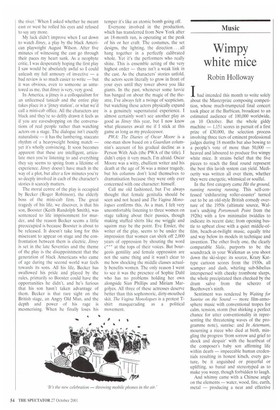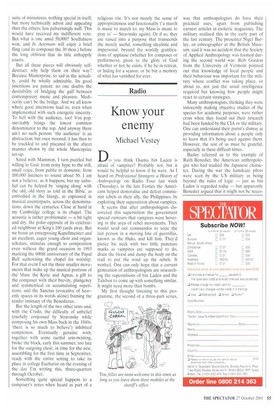Music
Wimpy white mice
Robin Holloway
Ihad intended this month to write solely about the Masterprize composing competition, whose much-trumpeted final concert took place at the Barbican, broadcast to an estimated audience of 100,000 worldwide, on 10 October. But the whole giddy machine — 1,151 scores in pursuit of a first prize of 00,000, the selection process involving three tiers of eminent professional judges during 18 months but also bowing to a people's vote of more than 50,000 — heaved and laboured to produce five wimpy white mice. It strains belief that the five pieces to reach the final round represent the best this lavish system can yield. Mediocrity was written all over them, whether they were energetic, whimsical or soulful.
In the first category came Hit the ground, running running running. This self-confessed 'exhilarating roller-coaster' turned out to be an old-style British comedy overture of the 1950s (ultimate source, Walton's undying Portsmouth Point from the 1920s) with a few minimalist twiddles to indicate its recent date; from opening bustle to upbeat close with a quiet middle-offilm, beach-at-twilight music, equally trite and way below its models in technique and invention, The other lively one, the clearly comparable Slala, purports to be the soundtrack in your Walkman as you shoot down the ski-slope: its source, Krazy Kattype cartoon scores from the 1930s, all scamper and dash, whirling sub-Sibelius interspersed with cheeky trombone slurps, the whole precipitated then checked by the drum salvo from the scherzo of Beethoven's ninth.
Sentiment was rendered by Waitmg for Sunrise on the Sound — more film-atmosphere music with conventional tropes for calm, tension, storm (but shirking a perfect chance for utter conventionality in representing the threatening waves of the programme note), sunrise: and In Aeternam, mourning a niece who died at birth, mingling the progress 'from sorrow and grief to shock and despair' with the heartbeat of the composer's baby son affirming life within death — impeccable human credentials resulting in honest kitsch, every gesture, be it anguished or prayerful or uplifting, so banal and stereotyped as to make you weep, though forbidden to laugh.
And whimsy came with a Chinese angle on the elements — water, wood, fire, earth, metal — producing a neat and effective suite of miniatures, nothing special in itself, but more technically adroit and appealing than the others; less pulverisingly naff. This would have received my indifferent vote. But what is one amid 50,000? Soulfulness won, and In Aetemam will enjoy a brief fling (and its composer the 30 thou.) before the long oblivion that its title unhappily courts.
But all these pieces will obviously selfdestruct: why help them on their way? Because Masterprize, so sad in the actuality, could be wholly admirable. Its good intentions are patent: no one doubts the desirability of bridging the gulf between contemporary music and pleasure. Mediocrity can't be the bridge. And we all know where good intentions lead to, even when implemented with such energetic sincerity. To hell with the audience, too! Vox pop. inevitably brings the lowest common denominator to the top. And anyway there ain't no such person: 'the audience' is an abstraction; but once mooted, it has then to be truckled to and placated in the abject manner shown by the whole Masterprize set-up.
Sated with Mammon, I turn puzzled but willing to God: from noisy hype to the still, small voice, from public to domestic, from 100.000 listeners to round about 50. I am not a beliewr, as it happens; but my unbelief can be helped by 'singing along' with the old, old story as told in the Bible, as embodied in the liturgy, as expressed in musical counterparts, across the denominations, down the centuries. Close at hand in my Cambridge college is its chapel. The acoustic is rather problematic — a bit tight and dry, the polar opposite of its celebrated neighbour at King's 100 yards away. But we boast an enterprising Kapellmeister and an excellent, eager young choir and organscholars, stimulus enough to composition even without the grand occasion in 1993 marking the 600th anniversary of the Papal Bull authorising the chapel for worship. For that event I set the three smaller movements that make up the musical portions of the Mass: the Kyrie and Agnus, a gift to the composer with their brevity, plangency and symmetrical or accumulating repetitions: and the Sanctus (evocative of heavenly spaces in its words alone) framing the tender intimacy of the Benedictus.
But the length of the two other texts and, with the Credo, the difficulty of unbelief (ruefully conjoined by Stravinsky while composing his own Mass back in the 1940s: 'there is so much to believe') inhibited completion. Eventually genuine wish, together with some tactful arm-twisting, broke the block, early this summer; too late for the outgoing choir, in time for the new, assembling for the first time in September, ready with the entire setting to take its place in college Eucharist on the evening of the day I'm writing this, three-quarters through October.
Something quite special happens to a composer's notes when heard as part of a religious rite. It's not merely the sense of appropriateness and functionality Ca march is music to march to: my Mass is music to pray to' — Stravinsky again). Or if so, they are raised into a purpose that transcends the merely useful, something idealistic and impersonal, beyond the worldly gratifications of applause (whether for composer or performers), given to the glory of God whether or not he exists, if he be in retreat, or hiding for a season, or be but a memory of what has vanished for ever.











































































 Previous page
Previous page